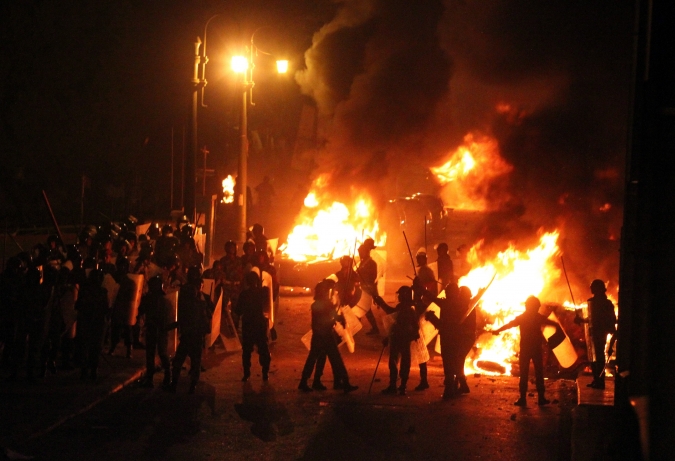
The Supreme Council of the Armed Forces’ (SCAF) performance leading Egypt through the transition to democracy has taken a turn for the worse over the last few months. Gone are the days when the popular chant, “The army and the people are one hand,” was heard by demonstrators everywhere. Tarnished is the image of the army that was initially hailed as the savior of the January 25th Revolution. In what can only be described as a roller coaster nine months, the SCAF has slowly stumbled into mistake after mistake that has eventually seen Field Marshal Tantawi and his council labeled as the hijackers of the revolution. Nowadays, anti-SCAF graffiti can be seen all over Cairo, anti-SCAF chants such as “The people want the fall of the Field Marshal” have become common, and general confidence in the Council has diminished after a series of blunders culminating in the Maspero Massacre last month.
Analyzing the SCAF’s actions over the month of October alone shows just how inept at dealing with the day-to-day politics of a nation – let alone a nation in transition, dealing with economic instability and facing strikes and demonstrations almost daily – the generals are, as they have lacked the swift responses required of a government that possesses the ability to rule, in addition to the innovation and creativity required of leaders trying to rid Egypt of its old ways.
On October 9th, what has now been named Bloody Sunday or the Sunday Massacre, scores of Egyptians (mainly Coptic Christians) marched toward the state TV building (Maspero) in protest of the tearing down of Mar Girgis church in the village of al-Marinab, Edfu in Aswan on the 30th of September. The response from Aswan Governor Major General Mustafa al-Sayed, to the tearing down of the church was absolutely appalling; he claimed, among other things, that the building was not a church, but in fact a guesthouse that was illegally transformed. Laughably the SCAF seemed paralyzed and showed next to no reaction to the incident, declining to dismiss the governor or punish others involved in the attack on the Church.
This brings us back to the march on the 9th of October. Rightfully enraged, many Egyptians organized a march from the Cairo neighborhood of Shubra and headed down to Maspero. What ensued was a bloodbath, and although the blame cannot be placed entirely on the army, the SCAF clearly mishandled the incident and should accept some responsibility. But instead of acknowledging its mistakes, the SCAF issued yet another communiqué insisting on the military’s innocence and hinting that protesters were to blame along with its favorite scapegoat: the invisible had of foreign agents intervening in Egyptian affairs. Again, this is not an attempt to put the entire blame on the SCAF, but merely to point out that even after the events there was no swift response, there was no proper explanation of what happened, only a man absolving the SCAF of any responsibility and shouldering most of the blame on protesters and outside forces. How can Egypt expect a transition to democracy when its transitional leaders can’t take responsibility for anything that goes wrong?
A few weeks later and the second major blunder occurred when the country witnessed the SCAF summoning Alaa Abdel Fattah (one of Egypt’s most prominent activists and bloggers) for questioning, for his involvement in the events of October 9th. Abdel Fattah refused to answer to the SCAF, claiming the involvement of the armed forces in the incident meant they did not have the legitimacy to conduct investigations. The response was a carbon-copy response of the regime of old. Fearing that this act of defiance would hinder their authority, Alaa was accused by the SCAF of inciting violence against the military and would be held in detention for 15 days (a period that can be renewed indefinitely).
Finally, to end the month on a high, in a meeting with most of the nation’s political powers with the exception of the Islamists (who boycotted the meeting), Deputy Prime Minister Ali al-Selmi proposed a troubling document outlining a set of 22 supra-constitutional principles to guide the process of drafting Egypt’s next constitution. The most concerning of those principles was Article 9, which grants the Supreme Council of the Armed Forces the exclusive right to oversee military affairs including the military budget. Additionally, it suggested that military’s total budget would be listed as a single figure in the overall national budget without a detailed breakdown of the proposed expenditures. Moreover, the draft gave the SCAF the right to determine the role the constituent assembly would play in creating the new constitution in addition to the power to interfere in the drafting process itself. The response from the public was overwhelmingly critical, insisting that the military should not enjoy special privileges above the state, nor should it function as a separate state.
Once again the SCAF has proven its inability to depart from the same policies practiced by the former regime, as evidenced by its failure to take any kind of responsibility for the events in Maspero while continuing to arrest bloggers and other critics of the military, and finally by giving themselves the right to draft supra-constitutional principles without public consultation or approval. The same “We Know What’s Best” attitude that was adopted under Mubarak has been preserved by the military generals, and what’s worse is that the strategy is failing miserably. One hopes, for the nation’s best interests that the SCAF realizes the error of its ways before even more damage to the transition is done.
Bahaa Hashem is a political activist and advisor to George Ishak, founder of the major grassroots movement Kefaya.
Image: Maspero%20clashes.jpg
